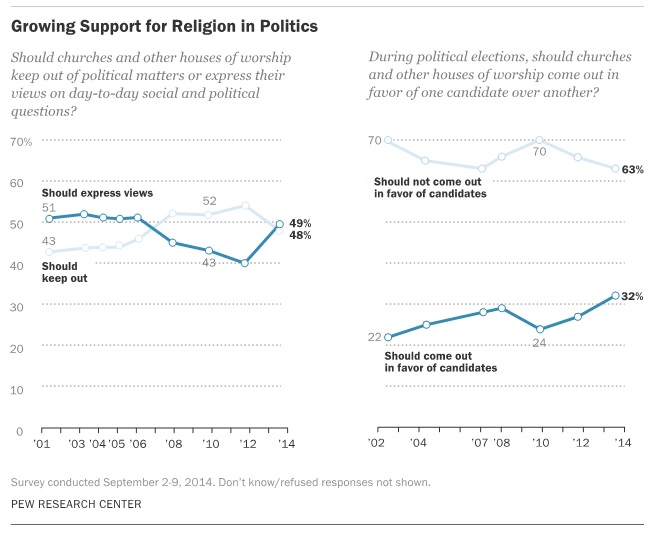Bernie Sanders' Response to Whether He Believes in God is Very Bold
By:
In case you missed it, Sen. Bernie Sanders did something very bold on "Jimmy Kimmel Live!" Wednesday night. He refused to answer a question about whether he believed in God.
Commenting about Republicans winning elections, Sanders quipped "God forbid," opening the door for Kimmel to ask about his previous statements about his religion:
"You say you're culturally Jewish, you don't feel religious. Do you believe in God, and do you think that's important to the people of the United States?"
RELATED: Bernie Sanders Told Jimmy Kimmel Where He Stands on Marijuana
Sanders' response dodged the question. Instead, he took the opportunity to talk about wealth and income inequality as well as his philosophy surrounding oppression and human suffering. Watch his remarks below:
Still, many Americans want more religion in their politics.
Some feel that this is a risky move for Sanders, who is already beating the odds in his presidential run as a self-described democratic socialist. (Less than half of Americans say they would consider voting for a socialist in 2016 according to a recent Gallup survey.) Now he will also have to contend with the label of atheist—whether true or not some are already calling him "the atheist candidate we have ben waiting for"—since he again left viewers in the dark about his religious beliefs. A recent Gallup poll also found that 40 percent of Americans said that they would not vote for a "generally well-qualified person" from their own political party if the candidate was an atheist.
RELATED: Here are Bernie Sanders' Stances On 5 Major Issues You Care About
A significant majority of Americans also feel that religious influence is waning in public life—and they report that it's a problem, so much of a problem that there is growing support for religion in politics. According to the Pew study, the "public's attitude for religious influence in politics is increasing in part because those who continue to identify with a religion [...] have become significantly more supportive of churches and [...] political leaders talking more about religion." Since many of those surveyed see religion as "a positive impact on society," the study suggests that concerns about the waxing impact of religion in our culture are causing a shift in what religious individuals desire from their clergy (speaking out on political issues and candidates) and their politicians (more open religious faith and prayer).
 Pew Research Center - pewforum.org
Pew Research Center - pewforum.org
It may not be advantageous for Sanders, then, that other candidates have not been so coy about their religious beliefs, particularly former presidential candidate and Wisconsin Gov. Scott Walker. He wrote in his first official appeal for donations:
"As you can imagine, the months leading up to my announcement that I would run for President of the United States were filled with a lot of prayer and soul searching. Here’s why: I needed to be certain that running was God’s calling — not just man’s calling. I am certain: This is God’s plan for me and I am humbled to be a candidate for President of the United States."
(h/t Salon.com)
So what's Bernie doing?
Although those with no religious affiliation—the "nones" as pollsters like to call them—are just as large a portion of the U.S. population as white evangelicals, they do not turn out to vote in equal numbers. It's possible that Sanders will invigorate this demographic, but it is just as likely that he could turn off religious voters.
Many are also heralding Sanders' comments as a proclamation of his lack of religious affiliation, which may be hasty. While Sanders stated on Kimmel that his philosophy "is not Judaism," it certainly matches up well with the most recent Pew study on American Jewish life as well as Sanders previous comments about being culturally Jewish. The 2013 report showed that Jews in the U.S. are increasingly moving away from any religious affiliation at all; almost one-quarter of American Jews stated that they had "no religion" when asked, while still identifying as proud of their Judaism. Atheism is also well entrenched in the American Jewish community and not considered contradictory by most.
"Judaism has variously been described as a religion, a way of life, as a people—although a people that does not depend on any particular ethnic background for membership," Los Angeles Rabbi Robin Podolsky told ATTN:. When asked about questions of atheism or faith in God, Podolsky stated, "Our approach as with almost everything is a struggle to understand what we mean by that. [...] For Sanders to say that he isn't sure is very mainstream."
Because of anti-Semitism, as Salon notes, it could be that Sanders is distancing himself from Judaism, as some feel that voters are still not ready to elect the first Jewish U.S. President.
Sanders' (possible) atheism isn't the main story.
The biggest takeaway should not be a discussion about whether Sanders is an atheist or not, although electing an 'out atheist' to the oval office would be groundbreaking. His side step of Kimmel's question allowed Sanders to tell the audience what he does believe in and what he would work for in office: an end to income inequality, paid family and medical leave, and universal healthcare.
